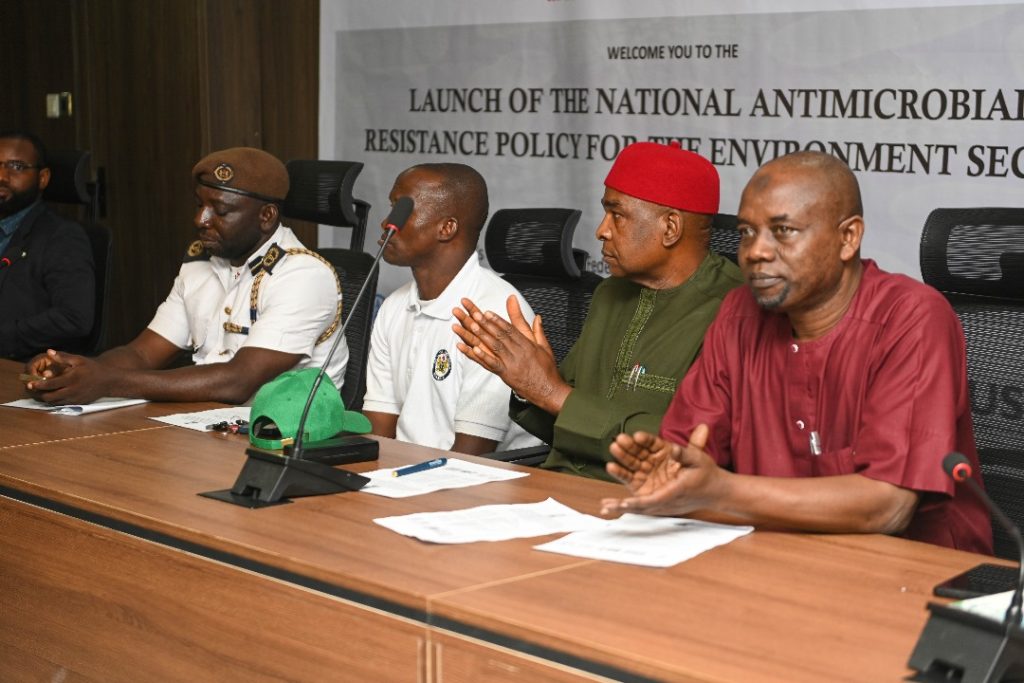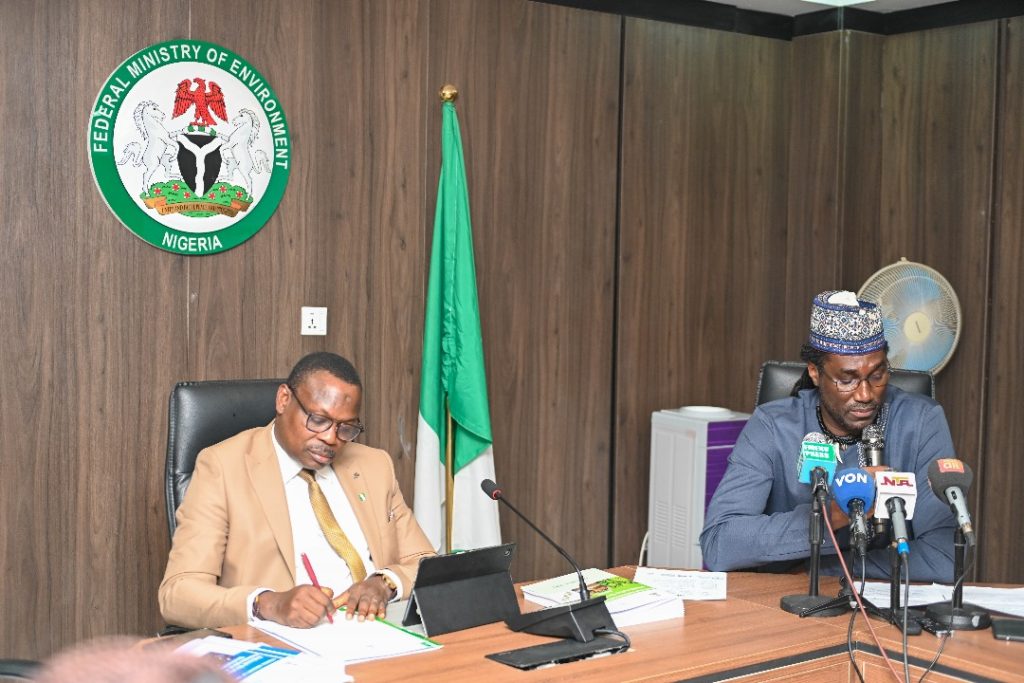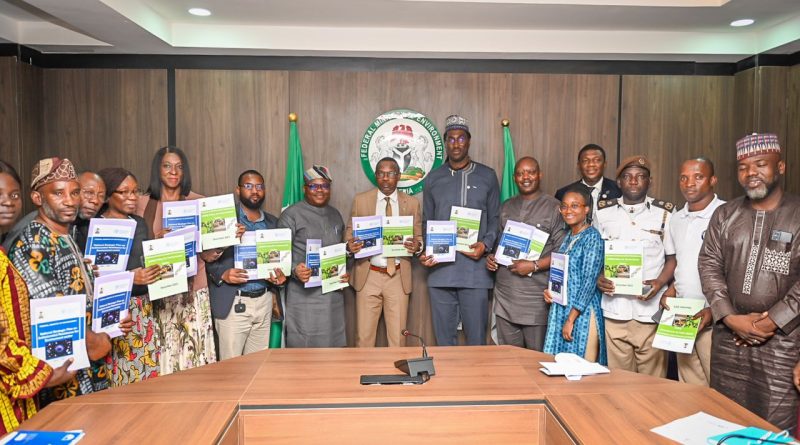Antimicrobial Resistance Crisis: Nigeria Launches Comprehensive Policy To Protect Humans, Animals And Environment
Antibiotics play a critical role in reducing the burden of communicable disease all over the world. However, resistance to previously potent antibiotics has become a major problem of public health requiring a range of interventions and multidisciplinary approaches. This growing trend of resistance to antibiotics calls for global action to monitor and control unnecessary use of antibiotics in humans and animals which eventually gets to the environment. The administration of Bola Ahmed Tinubu on Thursday, July 11, 20224, launched a comprehensive policy to combat Antimicrobial Resistance (AMR) in Nigeria in the Environment Sector.
Antimicrobial resistance is not only a public health threats, it has huge implications for global economic wellbeing and security, affecting both developed and developing countries. AMR is listed by the World Health Organization as one of the ten top threats to global health. According to the United Nations Environmental Programme (UNEP), AMR is a global crisis that cannot be understood or addressed separately from the triple planetary crisis. The report of the 2022 Global Antimicrobial Resistance and Use Surveillance System (GLASS) report highlights alarming resistance rates among bacterial pathogens that cause the deadliest infections with other pathogens like virus, fungi and protozoa also becoming resistant. This report shows that AMR threat is growing at an alarming rate making treatment challenging with longer hospital stays, increased mortality and higher healthcare cost. The World Bank estimates that AMR could result in US$ 1 trillion additional healthcare costs by 2050, and US$ 1 trillion to US$ 3.4 trillion gross domestic product (GDP) losses per year by 2030.

Speaking at the launch of the policy, the Minister of State for Environment, Dr. Iziaq Adekunle Salako said Nigeria as a responsible member of the global community is committed to adopting a holistic approach to addressing AMR to ensuring all sector involvement. To achieve this and protect public health, food security and the environment, the Minister said the recognition of the interconnectedness between human, animal and environmental health in line with the One Health principles is central.
Salako said the Federal Ministry of Environment has embarked on a number activities aimed at laying a solid foundation for AMR surveillance in the environment sector of our country. This includes:
• AMR situation analysis in environment sector conducted in 2020 including laboratory and capacity needs assessment of environmental reference laboratories domicile with NESREA to pave way for setting up AMR surveillance in the environment sector and provide recommendations for strengthening capacities for AMR surveillance within the sector.
• Establishment of the Integrated National Environmental Health Surveillance System (INEHSS) in 2022 for real time environmental health and sanitation scientific data collection and processing for informed policy decisions, planning, monitoring, evaluation, early warning signals and response to environmental health challenges including disease outbreak. The INEHSS provides a premise for AMR surveillance in the environment considering the unsound release of antimicrobial residues in our environment.

He said despite these efforts highlighted above, a lot still needs to be done for the environment sector to come up to speed and be at par with other One Health sectors with regards to AMR management.
“It is in this context and in line with the mandate of the ministry that this policy on national antimicrobial resistance for the environment sector has been developed. Through effective implementation of this policy and in collaboration with other stakeholders, the Federal Ministry of Environment intends to:
• create AMR surveillance system in the environment sector by integrating AMR into INEHSS which is an existing surveillance system in the environment sector, in order to provide timely alerts on AMR spread.
• regulate the discharge and distribution of antimicrobials into the environment.
• promote public knowledge and awareness on AMR and implication of indiscriminate Antimicrobial Discharge (AMD) into the environment.
• establish national standards for monitoring and controlling antimicrobials in the environment through the development of:
- roadmap for monitoring AMR in the environment
- standards for Antimicrobial residue, Antimicrobial Resistance Genes (ARG) and Antimicrobial Resistant Bacteria (ARB) discharge into the environment
- database of all allied industries, institutes, healthcare facilities and farms in Nigeria
- and most importantly strengthening of Environmental Health Officers’ capacity to track the activities of the culpable facilities.”
Salako noted that the nation stands to gain socio-economic benefits from the effective implementation of the AMR policy through improved public health and increased productivity.
“The incorporation of AMR surveillance in the Integrated National Environmental Health Surveillance System will afford us with timely alert on AMR spread enabling early detection of drug resistance and timely response. This will in turn reduce disease burden and improve general health outcomes. In addition, AMR surveillance will enable the detection and tracking of antimicrobial residues and resistance genes in environmental media (water, air and soil) thereby reducing environmental pollution. The country will stand to save the cost of clean-up and remediation of AMR polluted sites such as industrial areas, agricultural areas, waste management sites, and heavy metal polluted sites. AMR surveillance will ensure wildlife is not harmed by antimicrobials and drug resistant microorganisms in the environment. This ultimately protects human health by reducing the risk of zoonotic disease outbreak”, the Minister added.
Salako explained that the development of the policy that was launched today would further enhance the capacity of Nigeria to meet her obligations under the international health regulation and other global health security agreements that she is signatory to. He said the policy is in line with the Renewed Hope mantra of President Bola Ahmed Tinubu led administration “to improve Nigeria standing and dignity among the comity of Nations”

He called on the Press to sensitize and enlighten the populace on antimicrobial resistance menace and also support efforts to combat it, thereby protecting our environment and saving lives. He also appreciated the Food and Agriculture Organization (FAO) for their invaluable technical support in developing the Antimicrobial Resistance Policy for the Environment sector. He thanked Development Alternative Inc (DAI) and Fleming Fund UK who provided assistance to the Federal Ministry of Environment in strengthening One Health governance structure for AMR and Antimicrobial Use (AMU) by building laboratory capacity and strengthening surveillance systems for AMR and AMU across human, animal and environmental health sectors.
On the controversies around the release of Tela Maize to farmers in the country, the minister asserted that the release of Genetically Modified Organisms (GMOs) in Nigeria is not under political influence but done based on research, scientific evidence, and in the socio-economic interest of Nigeria.
He said the current media report that President Bola Ahmed Tinubu GCFR was the one enforcing GMOs on Nigeria is not correct. He added that records show that the Tela Maize was licensed in Nigeria by the National Biosafety Management Agency since 2021 after all due diligence in line with the law and global. best practices.




